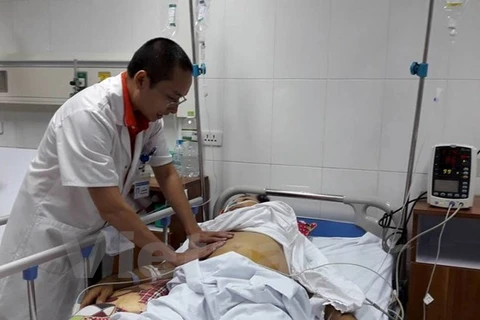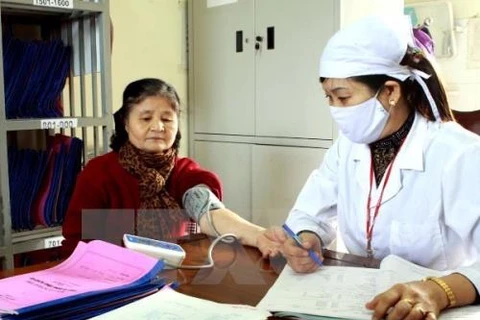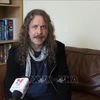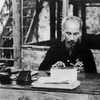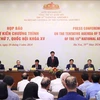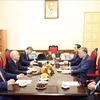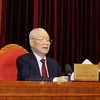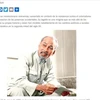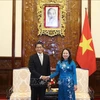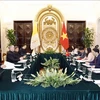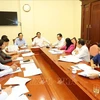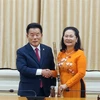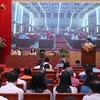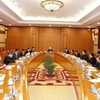Geneva (VNA) – Vietnam highly appreciates the World Health Organisation (WHO)’s role in developing health care policies and strategies and technical assistance at regional and global levels, affirmed Health Minister Nguyen Thi Kim Tien.
In her speech to the 70th session of the World Health Assembly in Geneva, Switzerland on May 23, Tien said Vietnam wishes to continue receiving financial and technical assistance from the WHO and partners to build a quality, effective, fair, responsible and sustainable health care system.
With continuous support from international community, Vietnam could ensure health care and welfare programmes are successful, she said.
On health care reform, Tien underscored the goal of building an appropriate and sustainable health care system, adding that Vietnam is strengthening medical establishments, particularly community medical stations, as well as family doctor models and services in public hospitals.
Vietnam also looks to develop health insurance for the whole population, which currently covers 82 percent of the total, including government subsidies for the poor, the disabled and ethnic minorities.
The Health Ministry pays attention to medical staff training and pooling social resources to cope with infectious diseases, she said, adding that Vietnam leads the region in implementing the global health security programme in this regard.
According to her, the Vietnamese government issued a national action programme to carry out the Agenda 2030 for Sustainable Development, aiming to ensure the involvement of the government and the public for common goals.
The 70th session of the World Health Assembly gathered nearly 3,500 delegates from 194 WHO member states who considered financial policies and the 2018-2019 budget. They discussed WHO response to emergency medical cases, polio, non-communicable diseases, antibiotic resistance, access to medicines and vaccines, health of refugees and migrants, among other topics.
Participants also looked into preparations for the UN General Assembly’s High-level Meeting on Non-communicable Diseases scheduled for September 2018.
On the occasion, former Ethiopian Health Minister Tedros Adhanom Ghebreyesus was elected as WHO Director General for the 2017-2022 tenure. He will take office on July 1 in place of Margaret Chan who has led the WHO for 10 years.-VNA
In her speech to the 70th session of the World Health Assembly in Geneva, Switzerland on May 23, Tien said Vietnam wishes to continue receiving financial and technical assistance from the WHO and partners to build a quality, effective, fair, responsible and sustainable health care system.
With continuous support from international community, Vietnam could ensure health care and welfare programmes are successful, she said.
On health care reform, Tien underscored the goal of building an appropriate and sustainable health care system, adding that Vietnam is strengthening medical establishments, particularly community medical stations, as well as family doctor models and services in public hospitals.
Vietnam also looks to develop health insurance for the whole population, which currently covers 82 percent of the total, including government subsidies for the poor, the disabled and ethnic minorities.
The Health Ministry pays attention to medical staff training and pooling social resources to cope with infectious diseases, she said, adding that Vietnam leads the region in implementing the global health security programme in this regard.
According to her, the Vietnamese government issued a national action programme to carry out the Agenda 2030 for Sustainable Development, aiming to ensure the involvement of the government and the public for common goals.
The 70th session of the World Health Assembly gathered nearly 3,500 delegates from 194 WHO member states who considered financial policies and the 2018-2019 budget. They discussed WHO response to emergency medical cases, polio, non-communicable diseases, antibiotic resistance, access to medicines and vaccines, health of refugees and migrants, among other topics.
Participants also looked into preparations for the UN General Assembly’s High-level Meeting on Non-communicable Diseases scheduled for September 2018.
On the occasion, former Ethiopian Health Minister Tedros Adhanom Ghebreyesus was elected as WHO Director General for the 2017-2022 tenure. He will take office on July 1 in place of Margaret Chan who has led the WHO for 10 years.-VNA
VNA




